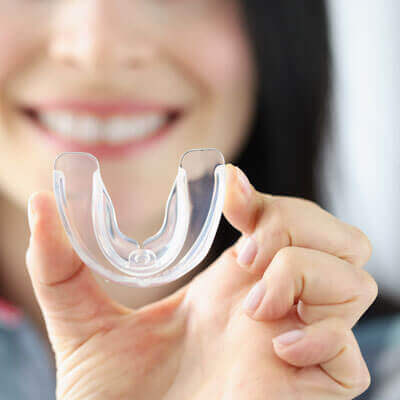 Do you grind or clench your teeth? If yes, you’re definitely not alone, as this condition (bruxism) is more common than you might think. While some people grind their teeth during sleep, others clench unconsciously during the day.
Do you grind or clench your teeth? If yes, you’re definitely not alone, as this condition (bruxism) is more common than you might think. While some people grind their teeth during sleep, others clench unconsciously during the day.
Spotting the Signs of Teeth Grinding
Grinding is often not detected because it happens subconsciously. However, dentists can spot telltale signs like flattened or chipped teeth, jaw discomfort, or even headaches. If you wake up with sore teeth or a stiff jaw, it’s important to mention that to your dentist. Being aware of habits like clenching when you’re stressed, for example, is also crucial.
Understanding the Root Causes
Teeth grinding often stems from a combination of factors, including stress, misaligned teeth, or certain sleep disorders like sleep apnoea. Identifying and addressing these underlying causes can significantly reduce the severity of bruxism. A comprehensive evaluation with one of our dentists can help pinpoint the triggers, allowing for a tailored treatment plan that tackles the issue from every angle.
Solutions for Teeth Grinding
At our practice, we offer a custom-fitted mouthguard, which is one of the best solutions for nighttime grinding. This device acts as a cushion, protecting your teeth from further damage. For daytime clenching, stress management techniques, such as mindfulness or relaxation exercises, can help. Your dentist might also recommend physiotherapy or jaw exercises to relieve tension and improve your bite alignment.
Why Acting Early Is Essential
Ignoring grinding can lead to severe damage, including cracked teeth, increased sensitivity, or even jaw joint issues like temporomandibular joint (TMJ) disorders. But if you address bruxism early, you can avoid costly treatments and maintain your long-term oral health.
Safeguard Your Pearly Whites
If you think you’re grinding your teeth, we encourage you to schedule a consultation today. We can discuss solutions like custom mouthguards and lifestyle adjustments. Our goal here at First Dental Studio is to help you get the most out of every visit to the dentist!
CONTACT US
* Any surgical or invasive procedure carries risks. Before proceeding, you should seek a second opinion from an appropriately qualified health practitioner such as a Specialist Oral Surgeon.
